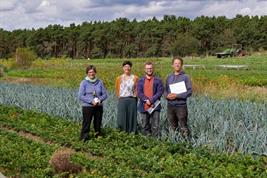25.09.2024

Researchers from the Leibniz Centre for Agricultural Landscape Research (ZALF) shared their latest research on the resilience of community -supported agriculture (CSA) with the Apfeltraum market garden in Eggersdorf near Müncheberg. The gardeners made their farm available to the researchers as a case study and provided detailed insights into their operations. The study, published in the journal Agricultural Systems, shows how CSA farms can strengthen their resilience to market and environmental changes through community and diversity.
The Apfeltraum market garden in Eggersdorf near Müncheberg has been producing vegetables since 2002. In 2017 the farm managers Annette Glaser and Boris Laufer switched to Community Supported Agriculture (CSA). Since then, they no longer produce vegetables for the weekly market or retail, but for a fixed community of customers. The production costs are shared by the group and compensated by a monthly fixed price. The CSA market garden "Gärtnerei Apfeltraum" served as a practice partner for a case study conducted by a ZALF research team. They investigated how the CSA principle contributes to a farm's resilience to market and environmental fluctuations. These mechanisms were then examined in a survey of 80 CSA farms from the national network of CSA farms in Germany (Netzwerk Solidarische Landwirtschaft e.V.).
The study identified the main positive effects for farms that had converted to solawi: greater income security and compatibility with environmentally friendly production, less dependence on the market and a higher quality of life, particularly in terms of satisfaction on solawi farms.
CSA strengthens farm resilience
In Germany, CSA farms, or CSAs as the farms are often referred to for short, are mainly located near urban areas, where there is a high demand for high-quality and sustainable agricultural products. Often the focus is on vegetable production, but there are also CSA farms that produce dairy products, grains, eggs, meat, fruits/nuts, etc. Young people are particularly interested in these types of farms. Over the past decade, the number of CSAs has grown significantly, from just under 50 to over 400. Although the share of food produced by CSAs is still small compared to global food production, it shows the growing importance of this alternative form of production. This study is the first to examine the CSA principle in detail to see how it can contribute to improving resilience at the farm level.
Resilience is the ability of farms to adapt to economic and environmental challenges while maintaining their functionality and stability. It includes the ability to respond to external shocks, such as market fluctuations or climate change, without compromising basic business processes.
The close partnership provides farmers with a stable financial base and reduces their dependence on fluctuating market prices. At the same time, CSA gives members access to fresh, locally produced food and the opportunity to actively influence agricultural production. CSAs grow a wide variety of crops to provide members with the widest possible range of products. This helps reduce the risk of crop failure. It also makes the farms more resilient to climatic and environmental changes.
"For us, the biggest advantage of community-supported agriculture is that we have a solid customer base around us whose member shares enable us to cultivate small-scale and diverse crops. This type of cultivation protects the climate, promotes biodiversity, and allows water to be used sparingly," says Boris Laufer, one of the two farm managers at "Gärtnerei Apfeltraum".
Study results handed over to the market garden "Gärtnerei Apfeltraum"
Annette Glaser and Boris Laufer form "Gärtnerei Apfeltraum" gave the researchers their time and a deep insight into their business for the case study. The results were used to design the survey for the other CSA farms. As a thank you, a celebratory handover of the study results from the researchers to the two farm managers took place last Thursday, September 12, 2024 on the premises of the market garden.
"Our collaboration has shown us how much a farm's resilience can be increased by switching to a community-supported agriculture model," says Anna Rosman, lead author of the study. The research results show not only economic benefits, but also ecological improvements that can be achieved through diversified production and soil-conserving cultivation methods.
Project partner:
- Leibniz Centre for Agricultural Landscape Research (ZALF), Müncheberg, Germany
- Faculty of Landscape Management and Nature Conservation, University for Sustainable Development (HNEE), Eberswalde, Germany
- Institute of Physical Geography & Landscape Ecology, Leibniz University Hannover, Germany
- Agricultural and Food Policy Group, Humboldt-Universität zu Berlin, Germany
- Netzwerk Solidarische Landwirtschaft e.V.
- Gärtnerei Apfeltraum, Eggersdorf OT Müncheberg
Funding:
This work was made possible through funding from the Digital Agriculture Knowledge and Information System (DAKIS) Project (ID: FKZ 031B0729A), financed by the German Federal Ministry of Education and Research (BMBF) and through the ZALF Integrated Priority Project 2022 ‘CrossDiv – co-designing smart, resilient, sustainable agricultural landscapes with cross-scale diversification’.
Further Information :
Original publication:
https://www.sciencedirect.com/science/article/pii/S0308521X2400218X?via%3Dihub
Text disclaimer:
This is a summary of the original text created with the help of artificial intelligence: [Full credit]. Rosman, A., MacPherson, J., Arndt, M., Helming, K. (2024) Perceived resilience of community supported agriculture in Germany. Agricultural Systems 220, Article 104068. https://doi.org/10.1016/j.agsy.2024.104068, published Open Access/ published under the license CC BY 4.0 https://creativecommons.org/licenses/by/4.0/.
The text has been carefully reviewed and revised in the light of AI regulations at ZALF.
